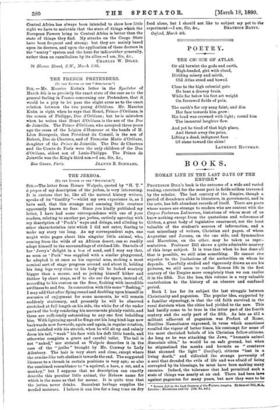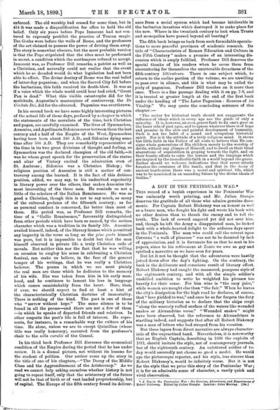BOOKS.
ROMAN LIFE IN THE LAST DAYS OF THE EMPIRE.*
PROFESSOR DILL'S book is the outcome of a wide and varied reading, exercised for the most part in fields seldom traversed by the scholar. The last century of the Empire, though a period of decadence alike in literature, in government, and in the arts, has left abundant records of itself. There are poets whose names are strange to readers who are content with the Corpus Poetarum Latinorum, historians of whom most of us know nothing except from the quotations and references of Gibbon, a great body of legislative enactment, not the least valuable of the student's sources of information, and a vast miscellany of writers, Christian and pagan, of whom Augustine and Jerome, on the one side, and Symmachns and Afacrobius, on the other, may be taken as reprc. sentatives. Professor Dill shows a quite admirable mastery of this large subject. It is true that when he has done all that is possible, we still miss something. He cannot rise superior to the limitations of the authorities on whom be depends. Carefully studied and vigorously drawn as are his pictures, we still seem to realise Roman life in the first century of the Empire more completely than we can realise it in the fifth. Not the less, this volume is a very valuable contribution to the history of an obscure and confused period.
Book I. has for its subject the last struggle between Christianity and paganism. The popular idea, supported by a familiar etymology, is that the old faith survived in the rural districts when the cities had yielded to the new. This had hardly come to be true in the latter part of the fourth century and the early part of the fifth. As late as 412 a militant adherent of paganism was Prefect of Rome. Rutilius Namatia.nus expressed, in verse which sometimes recalled the vigour of better times, his contempt for some of the most cherished beliefs of his Christian fellow-citizens. As long as he was attacking the Jews, " hamanis animal dissociale cibis," he would be on safe ground, but when he stigmatised the monks and hermits as " creatures that shunned the light" (lumfugi), citizens "lost in a living death," and ridiculed the strange perversity of a soul that dreaded the evils of life and was afraid of being corrupted by its blessings, he must have been making many enemies. Indeed, the tolerance that had permitted such a state of things was nearly at an end. There had been laws against paganism for many years, but now they were to be • Roman Life in the Last Century of the Western Ampire. By Samuel Dill, L.A. Loudon: Macmillan and Ca (121. 6.1. net.] enforced. The old worship bad ceased for some time, but in 414 it was made a disqualification for office to hold the old belief. Only six years before Pope Innocent had not ven- tured to expressly prohibit the practice of Tuscan magic. The Goths were before the walls of Rome, and the professors of the art claimed to possess the power of driving them away. The story is somewhat obscure, but the most probable version is that the Pope stipulated that the rites must be performed in secret, a condition which the soothsayers refused to accept. Innocent was, as Professor Dill remarks, a patriot as well as a Christian, and naturally could not realise that the event which he so dreaded would do what legislation had not been able to effect. The divine destiny of Rome was the real belief of latter-day paganism; and when the Sacred City fell before the barbarians, this faith received its death-blow. It was as if a voice which the whole world could hear had cried, "Great Pan is dead." What this visible catastrophe did for the multitude, Augustine's masterpiece of controversy, the De Civit ate Del, did for the educated. Paganism was overthrown.
In his second book we have some highly interesting pictures of the actual life of these days, prefaced by a chapter in which the statements of the moralists of the time, both Christian and pagan, are carefully examined. The lives of Symmachus, Ausonius, and Apollinaris Sidonius cover between them the last century and a half of the Empire of the West, Symmachus having been born about 340 A.D., and Sidonius dying some time after 500 A.D. They are remarkably representative of the time in its two great divisions of thought and feeling, as Symmachus was the declared champion of the old faith,—it was he whose great speech for the preservation of the statue and altar of Victory excited the admiration even of St. Ambrose ; Sidonius was a Christian Bishop ; the religious position of Ansonius is still a matter of con- troversy among the learned. It is the fact of this dubious position, added, we may say, to his undoubted superiority in literary power over the others, that makes Ausonius the most interesting of the three men. He reminds us not a little of the scholars of the Italian Renaissance. He was as good a Christian, though this is not to say much, as many of the cultured prelates of the fifteenth century; as far as personal conduct is concerned, far better than most of them. His period was, as Professor Dill remarks, the time of a "Gaulle Renaissance," favourably distinguished from other periods which have been so named, by the serious character which was a tradition in its family life. Ausonius availed himself, indeed, of the literary license which permitted any impurity in the verse as long as the plus poeta himself was pure, but it is impossible to doubt but that the man himself observed in private life a truly Christian code of morals. But neither this nor the fact that he was willing on occasion to employ his muse in celebrating a Christian festival, can make us believe, in the face of the general temper of his writings, that he was really a Christian believer. The poems in which we see most plainly the real man are those which he dedicates to the memory of his wife. She was taken from him in his early man- hood, and he continues to lament his loss in language which comes unmistakably from the heart. Here, then, if ever, we should expect to find at least a hint of the characteristically Christian doctrine of immortality. There is nothing of the kind. The poet is one of those who "sorrow without hope." The same silence is to be found in all the poems—and there are not a few of them —in which he speaks of departed friends and relatives. In other respects the poet's life is full of interest. He repre- sents, for instance, in a remarkable way the culture of his time. He alone, unless we are to except Quintilian (whose title was really honorary), mounted from the professor's chair to the sella curulis of the Consul.
In his third book Professor Dill discusses the economical condition of the Empire during the period that he has under review. It is a dismal picture, not without its lessons for the student of politics. Our author sums up the story in the title of one of his chapters,—" The Decay of the Middle Class and the Aggrandisement of the Aristocracy." As we read we cannot help asking ourselves whether history is not going to repeat itself, only that the aristocracy of the future will not be that of birth or of vast landed proprietorship, but of capital. The Europe of the fifth century found its deliver- ance from a social system which had become intolerable in the barbarian invasions which destroyed it to make place for the new. Where is the twentieth century to look when Trusts and monopolies have passed beyond all bearing P
The fifth book brings us back from such formidable specula- tions to more peaceful provinces of academic research. Its title of "Characteristics of Roman Education and Culture in the Fifth Century" makes a promise of an interesting dis- cussion which is amply fulfilled. Professor Dill deserves the
special thanks of his readers when he saves them from encountering for themselves the unutterable dreariness of the fifth-century litterateurs. There is one subject which, to return to the earlier portion of the volume, we are unwilling to pass over in silence, and this is what may be called the piety of paganism. Professor Dill touches on it more than once. There is a fine passage dealing with it on pp. 7-8, and
it is treated at greater length at the end of the first book under the heading of "The Later Paganism : Sources of its Vitality." We may quote the concluding sentence of this chapter :—
" The seeker for historical truth should not exaggerate the influence of ideals which in every age are the guide of only a minority. It is, however, an even graver fault to fix one's gaze on the baser aide of past ages, and to ignore whatever there is of hope and promise in the slow and painful development of humanity. Such is not the habit of a sound and scrupulous historical spirit. Nor is it the attitude of a truly religious mind. It shows but little faith in the Father of all souls to believe that He con- signs whole generations of His children merely to the worship of devils, without any glimpse of Himself, and to dwell on their blind aberrations of superstition in groping towards the light, and on their frantic efforts to calm the terrors and the longings which are inspired by the ineradicable faith in a world beyond the grave. Rather should we welcome indications that God never utterly forsakes the creatures of His bands, and that in the decay of ancient heathenism there was a moral and spiritual life, which was to be nourished in an unending future by the divine ideals of Galilee."







































 Previous page
Previous page